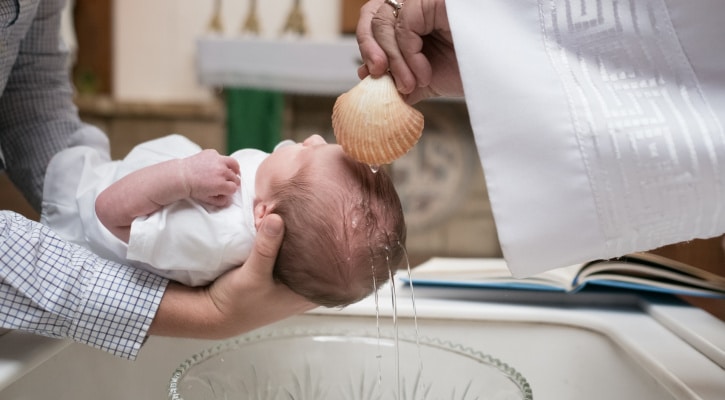Having a baby baptized is both an act of faith and a cultural affair. It is both a statement of trust in the goodness of God as well as a family event that can be faith-filled.
When a couple brings their little one home from the hospital, he or she is capable of very little. The baby does not talk, walk, eat with a fork, or brush his or her teeth. The parents need to teach all these things over the course of many years. In broad terms, the parents must introduce their son or daughter to their cultural heritage and social customs so that he or she grows up to be a well-adjusted individual. That’s the goal and the responsibility of the parents. Sharing faith with the child and introducing him or her into the social customs of the faith community are a part of this responsibility for the parents as well. To fail regarding faith formation is a serious reneging of parental responsibility.
But not everyone appreciates that fact. Society has tried to make the practice of religion a private affair, and some even leave the choice of religion up to the individual. We have a responsibility to share our cultural heritage with our children, which includes our religious heritage.
Parents are not alone in this task. They have the help of the godparents as well as the entire faith community, for all share in the mission of passing on the faith (cf. CCC 1255).
This is not always an easy task. Children have free will. But that free will can lead to a child rejecting not only the faith training a parent might offer, but the cultural training as well. In the end, the example offered and witnessed to by the adult faith community often sinks into the child’s heart. There, with the grace of God, Catholic adults are truly formed.
Can children born outside of marriage be baptized in the Catholic Church?
Yes, if there is good reason to believe that he or she will be brought up in the practice of the faith. To refuse Baptism just because the child was born outside of marriage would be to punish the child for something he or she had no control over. But it would also be unjust to baptize a child with no hope of that child being raised in the Catholic faith. Baptism looks to the future and presumes a life of education and training as well as the future reception of sacraments. To set the child up for this new life and then renege on the promise would be truly unfair.
The real question is whether there is any hope that the child will be raised Catholic. The question of legitimacy really doesn’t enter into the discussion.
Can anybody perform the Sacrament of Baptism?
Ordinarily, it is a deacon, priest, or bishop who administers the Sacrament of Baptism. But Church law states: “In case of necessity, anyone, even a non-baptized person, with the required intention, can baptize, by using the Trinitarian baptismal formula. The intention required is to will to do what the Church does when she baptizes” (CIC 1256).
The required Trinitarian baptismal formula is simply to say, while pouring the water or immersing the person three times, “I baptize you in the name of the Father, and of the Son, and of the Holy Spirit. Amen.”
“In case of necessity” is usually interpreted as some urgent situation when a deacon, priest, or bishop is not available and a person is likely to die with being baptized. This most frequently applies to neonatal hospital workers and emergency personnel.
If the person recovers, the Church adds the other rituals in a more celebratory setting at a later date to celebrate and welcome the new member of the faith community in a more festive manner. The person, however, does not need to be baptized again.
Is there a connection between the name of the person being baptized and a saint?
Canon law states that “parents, sponsors, and the pastor are to take care that a name is not given which is foreign to Christian sentiment” (CIC, can. 855). Since this norm is stated in the negative, it can be interpreted in the narrowest sense possible. Thus, only a name which is “foreign to Christian sentiment” is to be avoided.
That doesn’t specifically say what name can be used, and this might well be because of cultural differences. It is quite common, for example in Hispanic cultures, to name a boy, Jesús. In an English-speaking culture, to give a boy such a name might seem odd or sacrilegious. It would be considered “foreign to Christian sentiment.”
The practice of selecting a saint’s name for a child was originally meant to offer the child the protective prayers and example of a patron saint. Today it seems, there is less devotion to patrons, at least when it comes to naming a child.
Perhaps a compromise between these two traditions might be to at least choose a recognizable saint’s name as a middle name if not a first name.
What is the role of godparents?
Godparents or sponsors for baptism should be chosen carefully. Their function is specified in Catholic law and choosing someone ought to be more than offering a compliment or reward to a friend or relative.
Church norms distinguish between sponsoring an adult and sponsoring an infant. The sponsor for an adult is to assist the person through his or her instructions (usually RCIA), to present the person for his or her reception into the Church, and then to assist him or her in Christian living.
The sponsor for an infant is to present the child for baptism along with the parents, and to assist the child to live a life befitting the baptismal dignity. This often is a supportive role, but could be a more direct role should the parents become incapacitated in their role as Christian parents. The sponsor is not required to adopt the child, but to see to his or her Christian upbringing (cf. CIC, can. 872).
To function as a sponsor for baptism, a person must be at least 16 years old; have received baptism, confirmation, and the Eucharist; and be a practicing Catholic—one who participates in the Eucharist weekly, is not under any canonical penalty, and is living according to the norms of the Church (cf. CIC, can. 874). A non-Catholic may serve as a witness, but in that case, there must be at least one Catholic sponsor. Finally, the sponsors must be one man or one woman, or one of each (cf. CIC, can. 873).
The role of a godparent is a serious matter—not a social position, but a deeply religious one. Godparents play an important though supportive role in the life of a child, one which complements that of the parents. Often, children look to or need other adults in their lives, and godparents can be logical alternatives to the biological parent.
Is immersion more valid than sprinkling water over the head of the child?
There are three equally valid methods of baptizing: pouring water over the forehead, sprinkling water over the head, or total immersion. All methods have the same effect because the essence of baptism is not the form of the water rite, but the action of God who lovingly adopts the baptized person, offering him or her the possibility of eternal life.
There may be practical reasons for choosing one form over the others, but all are equally valid.









4 thoughts on “Understanding the Sacrament of Baptism”
My daughter and her boyfriend are not married but would like their newborn be baptized in a Catholic church. We are Roman Catholics and believe that our granddaughter should be baptized.
What are the requirements and schedule?
Would appreciate to hear back from you sooner.
Thank you kindly.
I have a almost 4 year old autistic child and a 1 year old how do you baptize an autistic child and a 1 year old I am sure I did it right I want them done July 22nd
My girlfriend has decided to get baptized, but her whole family is not in this country, and none of them are Christian or catholic. So I am the only one with the basic requirements to help her.
I would like to know where she can get baptized in Vancouver and if there is any cost.
I also would like to know if it is possible for her to get baptized with only one person (me) who has all the requirements to be sponsor or Godparent. Thank you.
Both my children would love to be part of our Catholic Church and will need to be baptized! I have a 12 year old and a 7 year old! I will be needing to know how to register 🙂